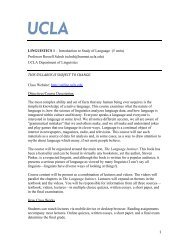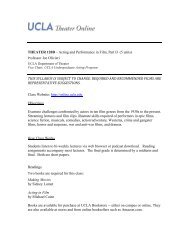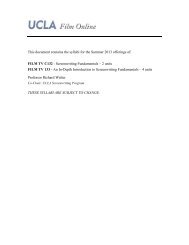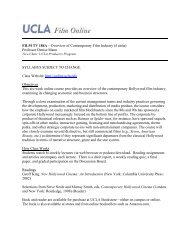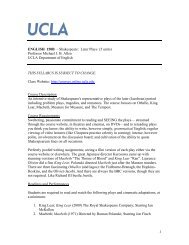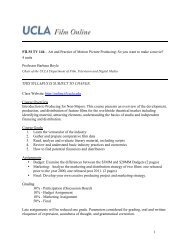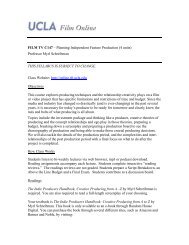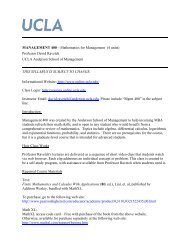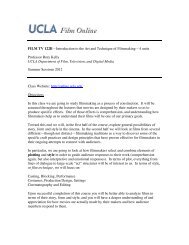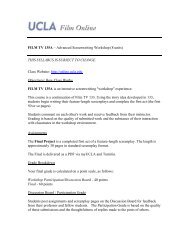THEATER 106 - UCLA Summer Sessions Online Courses
THEATER 106 - UCLA Summer Sessions Online Courses
THEATER 106 - UCLA Summer Sessions Online Courses
You also want an ePaper? Increase the reach of your titles
YUMPU automatically turns print PDFs into web optimized ePapers that Google loves.
<strong>THEATER</strong> <strong>106</strong> – History of American Theater and Drama (5 units)<br />
Professor Gary Gardner<br />
<strong>UCLA</strong> Department of Theater<br />
Vice Chair, <strong>UCLA</strong> MFA in Playwriting<br />
THIS SYLLABUS IS SUBJECT TO CHANGE.<br />
Class Website: http://online.tft.ucla.edu<br />
Objectives:<br />
A survey of great American plays of the 20 th century and some lesser-known jewels they<br />
have inspired.<br />
How Class Works<br />
Students listen to bi-weekly lectures via web browser or podcast download. Reading<br />
assignments and articles accompany each lecture. There is a midterm, a final and graded<br />
participation on the Discussion Board.<br />
Readings<br />
The following plays are required reading:<br />
1. Desire Under the Elms by Eugene O’Neill in: “Three Plays by Eugene O’Neill<br />
2. Our Town by Thornton Wilder<br />
3. Death of a Salesman by Arthur Miller<br />
4. Loman Family Picnic by Donald Marguiles<br />
5. A Streetcar Named Desire by Tennessee Williams<br />
6. Inherit the Wind by Jerome Lawrence and Robert E. Lee<br />
7. Raisin in the Sun by Lorraine Hansberry<br />
8. The American Dream and The Zoo Story by Edward Albee<br />
9. The Heidi Chronicles by Wendy Wasserstein<br />
10. The Piano Lesson by August Wilson<br />
11. August: Osage County by Tracey Letts<br />
12. Long Day’s Journey Into Night by Eugene O’Neill<br />
13. The Kentucky Cycle by Robert Schenkkan
The following play and recording, both required, are available from the Class Website:<br />
14. Belle Reprieve by Split Britches Collective<br />
15. Ragtime (Cast Recording)<br />
Plays are available for purchase at <strong>UCLA</strong> Bookstore—either on campus or online. They<br />
are also available at stores and from online booksellers such as Amazon.com.<br />
Screenings:<br />
Recommended films can be streamed at low resolution from the Class Website. Films<br />
chosen for assignments or papers should be viewed at full quality on DVD or via web<br />
services such as iTunes or Netflix.<br />
Assignments<br />
Midterm – 2 to 3 page paper<br />
Final – 5 page paper available two weeks in advance<br />
Grade Breakdown:<br />
Your final grade is calculated on a point scale, as follows:<br />
Participation (Discussion Board):<br />
Midterm:<br />
Final:<br />
30 points<br />
30 points<br />
40 points<br />
Discussion Board<br />
The Participation grade is based on contributions to the Discussion Board.<br />
The exchange of ideas on the Discussion Board is between you and your classmates.<br />
Your TA is both moderator and active contributor. He or she will reinforce concepts<br />
introduced in lecture and readings and assign exercises to advance the development of<br />
individual student storylines.<br />
Weekly Discussion Board Questions<br />
Your instructor posts 2 questions on the Discussion Board every Monday. You must<br />
answer both questions. You are encouraged to respond to the posts of others.
Guidelines for Posting<br />
These are not Discussion Board posts as you know them. They are mini-essays.<br />
Properly written English is required. You must make an argument and support it with<br />
references to the readings, lecture and clips. Examples from your own independent<br />
study or experience are appropriate if they advance your argument. You are graded on<br />
substance, not length. Write what you need to make your point.<br />
Evaluation of Posts<br />
Posts are evaluated on both individual merit and the contribution they make to the<br />
unfolding discussion. Timely posting is required, but avoiding late posts is not the key to<br />
a good participation grade. Instead, keep the following in mind:<br />
- be a presence on the board, have a voice, be memorable, an active citizen<br />
- posting early in the week increases the chances of getting helpful feedback<br />
- lively, thoughtful posts can help your grade overall<br />
and:<br />
- posts in response to a previous week’s questions are not likely to be read by your TA<br />
- posts are not time-stamped; LATE means you left no impression on your TA that week<br />
- TAs only tally posts and deadlines met if a final grade needs help<br />
Policies<br />
This class takes advantage of my<strong>UCLA</strong> and a third-party service known as Turnitin.<br />
Submissions are screened for improper citations and potential plagiarism. Quotes or<br />
ideas paraphrased from other work must be properly cited.<br />
SCHEDULE<br />
Week One<br />
Lesson 1: Introduction: Broadway: the Golden Age<br />
Screening: Broadway the Golden Age, Directed by Rick McKay, 2003<br />
Discussion Board: answer instructor questions, respond to classmate posts<br />
Lesson 2:<br />
O’Neill Tragedies<br />
Reading:<br />
Desire Under the Elms, by Eugene O’Neill<br />
Screening: The American Experience: Eugene O’Neill, PBS, 2006
Week Two<br />
Lesson 3:<br />
Reading:<br />
Sentimentalism<br />
Our Town, Thornton Wilder<br />
Screening: ShowBusiness: The Road to Broadway<br />
Producer, Rosie O’Donnell , Director, Dori Berinstein, 2007<br />
Articles: Our Town, New York Times, 1938<br />
Thornton Wilder, New Yorker, 1959<br />
Discussion Board: answer instructor questions, respond to classmate posts<br />
Lesson 4:<br />
What is tragedy? What is Tragic Comedy?<br />
Reading: Death of a Salesman, by Arthur Miller, 1949<br />
Loman Family Picnic, by Donald Margulies, 1993<br />
Screening: Elaine Stritch at Liberty, Dirs. Nick Doob and Chris Hegedus, 2002<br />
Articles: Death of a Salesman, New York Times, 1949<br />
Arthur Miller, New Yorker, 1995<br />
Arthur Miller, New Yorker, 1996<br />
Week Three<br />
Lesson 5:<br />
What is Deconstruction?<br />
Reading: A Streetcar Named Desire, by Tennesee Williams, 1947<br />
Belle Reprieve, by Split Britches Collective, 1991<br />
Screening: A Streetcar Named Desire, Director, Elia Kazan, 1951<br />
<strong>Summer</strong> and Smoke, Director, Peter Glenville, 1961<br />
Articles: A Streetcar Named Desire, New York Times, 1947<br />
Tennessee Williams, New Yorker, 1996<br />
Tennessee Williams, New Yorker, 2000<br />
Discussion Board: answer instructor questions, respond to classmate posts<br />
Lesson 6:<br />
Dramatization of Social Issues<br />
Reading: Inherit the Wind, by Jerome Lawrence and Robert E. Lee, 1955<br />
Screening: Inherit The Wind, Dir. Stanley Kramer, 1960<br />
Articles: Inherit the Wind, Newark Evening News, 1955<br />
Inherit the Wind, Christian Science Monitor, 1955<br />
Inherit the Wind, Morning Telegraph (Bolton), 1955<br />
Inherit the Wind, Morning Telegraph (Freedley), 1955<br />
Inherit the Wind, New Yorker, 1955
Week Four<br />
ASSIGNMENT DUE: Midterm<br />
Lesson 7:<br />
Discussion of Race<br />
Reading: A Raisin in the Sun, by Lorraine Hansbury, 1959<br />
Screening: Eyes on the Prize, Directed by Judith Vecchione, 1987<br />
Articles: A Raisin in the Sun, New York Times, 1959<br />
Lorraine Hansberry, New Yorker, 1959<br />
Discussion Board: answer instructor questions, respond to classmate posts<br />
Lesson 8:<br />
Reading:<br />
Absurdism and Albee<br />
Two One-Act Plays<br />
The Zoo Story, by Edward Albee, 1959<br />
The American Dream, by Edward Albee, 1961<br />
Screening: Profile of Edward Albee, Directed by Nigel Watts, 1995<br />
Who’s Afraid of Virginia Woolf?, Directed by Mike Nichols, 1966<br />
Articles: The American Dream, New Yorker, 1961<br />
Edward Albee, New Yorker, 1961<br />
Week Five<br />
Lesson 9:<br />
Feminism<br />
Reading: The Heidi Chronicles, by Wendy Wasserstein, 1988<br />
Screening: Uncommon Women and Others, PBS Great Performances, 1978<br />
Articles: The Heidi Chronicles, New York Times, 1988<br />
The Heidi Chronicles, New Yorker, 1988<br />
Wendy Wasserstein, New Yorker, 1995<br />
Discussion Board: answer instructor questions, respond to classmate posts<br />
Lesson 10:<br />
The August Wilson Tragedies<br />
Reading: The Piano Lesson, by August Wilson, 1987<br />
Screening: August Wilson: The American Dream in Black and White<br />
Articles: The Piano Lesson, New York Times, 1990<br />
August Wilson, New Yorker, 2001
Week Six<br />
Lesson 11:<br />
Dysfunctional Families<br />
Reading: August: Osage County, by Tracey Lets, 2007<br />
Long Day’s Journey into Night, by Eugene O’Neill, 1956<br />
Screening: Long Day’s Journey into Night, 1962<br />
Articles: Long Day's Journey Into Night, New York Times, 1956<br />
August: Osage County, New York Times, 2007<br />
August: Osage County, New Yorker, 2007<br />
Discussion Board: answer instructor questions, respond to classmate posts<br />
Lesson 12:<br />
Ragtime and The Kentucky Cycle<br />
Reading: The Kentucky Cycle, by Robert Schenkkan<br />
Listening: Original Cast Recording of Ragtime<br />
Articles: The Kentucky Cycle, New York Times, 1993<br />
Ragtime, New York Times, 1998<br />
ASSIGNMENT DUE: Final



